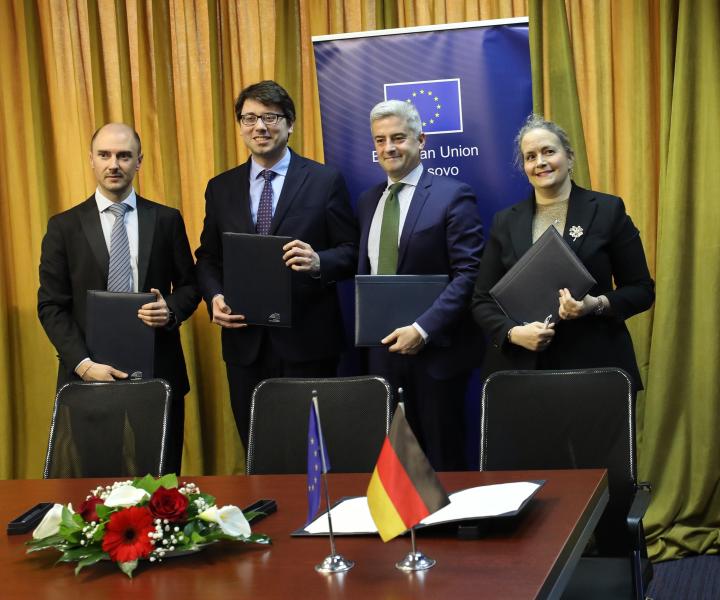
- The EIB is providing €33 million for the construction of one of Kosovo’s largest solar photovoltaic plants.
- In line with the EU Global Gateway initiative, the project will also benefit from a €29 million loan from the KfW Development Bank and a €32 million EU grant channelled through the Western Balkans Investment Framework
- The new plant will contribute to higher energy security and the phasing out of coal-based power generation.
To support the green transition in Kosovo*, the European Investment Bank (EIB) has signed a €33 million investment loan for the construction one of its largest solar photovoltaic plants near Pristina - with a capacity of up to 100 MWac (120MWp). By increasing the share and capacity of solar energy in power generation, the project will contribute to energy supply security, a faster green transition and economic growth in the region. Upon completion, the plant is expected to produce around 169 GWh of electricity and displace 174 000 tonnes of CO2 a year on average.
The investment benefits from Team Europe support, enabling the allocation of a €32 million EU grant channelled through the Western Balkans Investment Framework for the project’s preparation and implementation. The grant will be combined with loans from the EIB (€33 million) and KfW (€29 million), which will implement the project under the Mutual Reliance Initiative aiming to increase the effectiveness of combined financing and expertise.
EIB Vice-President Kyriacos Kakouris, who is responsible for the Bank’s activities in the Western Balkans, said: “As one of the largest renewable energy developments in the region under Team Europe, this project will help Kosovo achieve its energy security and renewable energy goals. Together with the European Commission and other partners, we are glad to be able to jointly help Kosovo lay the groundwork for the decarbonisation of the local economy and diversification of the energy mix, in line with the EU Green Agenda.”
Kosovo’s Minister of Finance, Labour and Transfers Hekuran Murati said: “The signing of today's agreement for the construction of the photovoltaic plant is a landmark moment as Kosovo advances its initiatives to secure renewable energy use for its citizens. This project, the largest of its kind in the region, not only guarantees a sustainable energy production method but also accelerates Kosovo's shift from conventional energy sources.”
Head of Political Section at the EU Office in Kosovo AnnaCarin Platon stated: “Investing in Kosovo's renewable energy infrastructure is not just a strategic decision; it's a commitment to a sustainable future for generations to come. The launch of one of the largest renewable energy developments in the region under Team Europe marks a significant milestone in our collective efforts towards green energy transition and economic growth, as well as job creation and skills development in the Western Balkans."
Background information:
About the EIB
The EIB is the long-term financing institution of the European Union, owned by its Member States. It makes long-term finance available for sound investment in order to contribute towards EU policy goals. The EIB supports projects in four priority areas: infrastructure, innovation, climate and environment, and small and medium-sized enterprises (SMEs).
About EIB in the Western Balkans:
The EIB is a leading international financier in the Western Balkans. Since 2010, the Bank has financed projects worth over €10 billion in the region. Besides continuing its support for the reconstruction and upgrading of public infrastructure, the EIB has expanded into many new areas since 2010, including healthcare, research and development, education, and small and medium enterprises. For detailed information on EIB activities in the Western Balkans, please visit: www.eib.org/en/publications/the-eib-in-the-western-balkans.
For more information regarding the EIB’s projects in Kosovo, please see: https://www.eib.org/en/projects/regions/enlargement/the-western-balkans/kosovo/index.htm
* This designation is without prejudice to positions on status and it is in line with UNSCR 1244/1999 and the ICJ Opinion on the Kosovo declaration of independence

